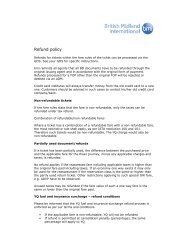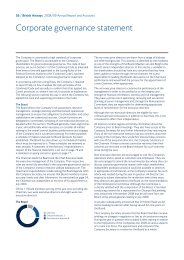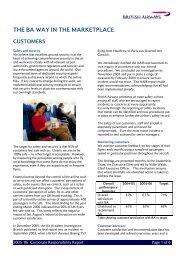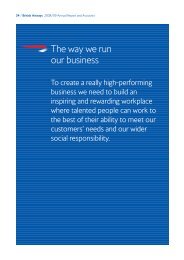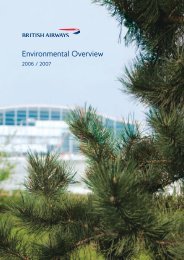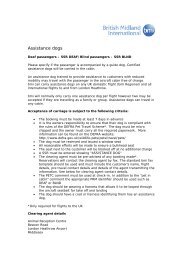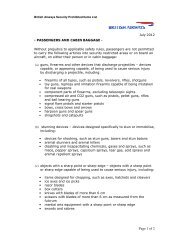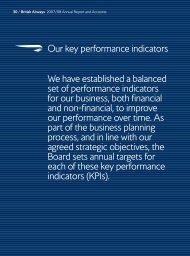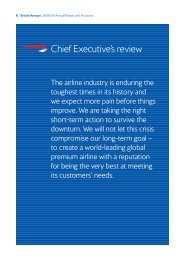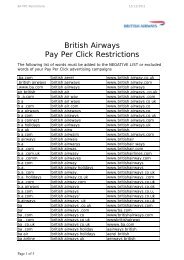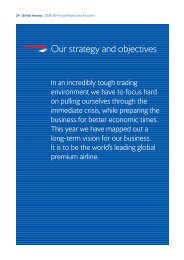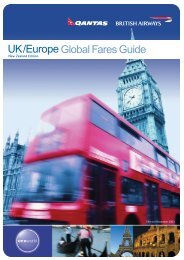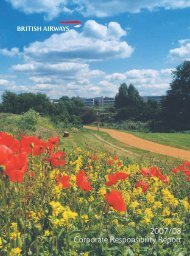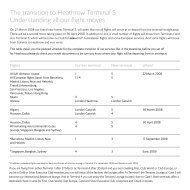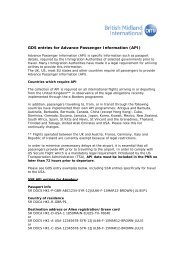Our business (784kb pdf) - British Airways
Our business (784kb pdf) - British Airways
Our business (784kb pdf) - British Airways
You also want an ePaper? Increase the reach of your titles
YUMPU automatically turns print PDFs into web optimized ePapers that Google loves.
50 / <strong>British</strong> <strong>Airways</strong> 2008/09 Annual Report and Accounts<br />
The way we run our <strong>business</strong><br />
Environment<br />
“In March 2009 our carbon<br />
offset scheme became the<br />
first airline offset product<br />
to meet the requirements<br />
of the UK Government’s<br />
Quality Assurance Scheme.”<br />
Over<br />
55,000<br />
tonnes of CO 2 were offset<br />
by customers in 2008.<br />
35%<br />
of dry waste at Heathrow<br />
and Gatwick was recycled<br />
in 2008.<br />
Climate change<br />
Climate change is an issue of huge<br />
importance to us and we have a long-term<br />
commitment to address it. <strong>Our</strong> climate<br />
change programme covers four main areas:<br />
policy measures to curb emissions growth;<br />
voluntary carbon offsetting; fuel efficiency;<br />
and support for scientific research.<br />
<strong>Our</strong> target is to reduce our net CO 2<br />
emissions by 50 per cent by 2050, relative<br />
to 2005. Meeting this target will require<br />
investment in new technology, sustainable<br />
biojet fuels and in cost-effective emissions<br />
reductions in other sectors of the economy<br />
through the creation of effective global<br />
carbon trading markets.<br />
Governments will come together in<br />
December 2009 to discuss a future global<br />
agreement on climate change. International<br />
aviation emissions were not included in<br />
the Kyoto Protocol, but we believe that<br />
they must be incorporated into this new<br />
agreement. We are playing a leading role<br />
in aviation groups to develop a global<br />
policy approach for the sector.<br />
In December 2008 the European Union<br />
finalised the conditions for including<br />
aviation in its Emissions Trading System<br />
(ETS). With our experience of emissions<br />
trading since 2002 we are well placed<br />
to meet the EU ETS requirements.<br />
<strong>Our</strong> offsetting scheme allows passengers<br />
to add a carbon offset when they book a<br />
flight through ba.com. During 2008, some<br />
150,000 customers offset over 55,000<br />
tonnes of CO 2 in this way and their<br />
contributions have helped fund UNcertified<br />
carbon cutting initiatives in China<br />
and Brazil. In March 2009 our scheme<br />
became the first airline offset product<br />
to meet the requirements of the UK<br />
Government’s Quality Assurance Scheme<br />
for Carbon Offsetting – a guarantee that<br />
we are achieving genuine, additional and<br />
measurable carbon reductions.<br />
We continue to look for ways to improve<br />
fuel efficiency and over 600 projects have<br />
so far been assessed. Of these, 55 have<br />
been implemented, delivering over 65,000<br />
tonnes of CO 2 savings, equivalent to nearly<br />
21,000 tonnes of fuel. In addition, we<br />
have reduced CO 2 emissions associated<br />
with our UK property portfolio by nearly<br />
11 per cent.<br />
In 2008 our carbon efficiency, expressed<br />
in grammes of CO 2 per passenger kilometre<br />
(gCO 2 /pkm), was just over 107 grammes.<br />
<strong>Our</strong> target is to improve that figure to 83<br />
gCO 2 /pkm by 2025. <strong>Our</strong> carbon footprint<br />
was 17.6 million tonnes of CO 2 in 2008.<br />
We are also supporting a number of<br />
scientific research projects. These include<br />
the European Commission’s IAGOS<br />
project which is investigating whether<br />
aircraft can be used to collect atmospheric<br />
data in-flight and a partnership to develop<br />
new policies on preventing deforestation.<br />
Waste<br />
We aim to minimise waste, reduce disposal<br />
to landfill and increase reuse and recycling.<br />
Where we cannot prevent waste disposal,<br />
we aim to manage our waste responsibly.<br />
In 2008 we recycled 35 per cent of dry<br />
waste at Heathrow and Gatwick (up from<br />
30 per cent the year before). We have set<br />
ourselves the target of recycling 50 per<br />
cent by 2010. We will achieve this through<br />
the provision of more recycling centres,<br />
handling a wider range of materials and by<br />
encouraging better segregation of waste.<br />
The amount of waste at Heathrow and<br />
Gatwick sent to landfill fell by 7.2 per cent<br />
to 3,424 tonnes, during the year. <strong>Our</strong> nonrecyclable<br />
waste at Heathrow and Gatwick<br />
will be processed through a waste to<br />
energy plant before the end of 2009,<br />
helping us to meet our target of zero<br />
waste to landfill by 2010.<br />
Noise<br />
We are investing in quieter aircraft and<br />
technology and aim to change the way<br />
we fly to reduce the noise of our activities.<br />
We have set a target to reduce our average<br />
noise per flight by 15 per cent by 2015.<br />
Night noise is a particular concern for<br />
people living near Heathrow and is one of<br />
the key issues we want to address. During<br />
2008, we contravened the noise limits at



